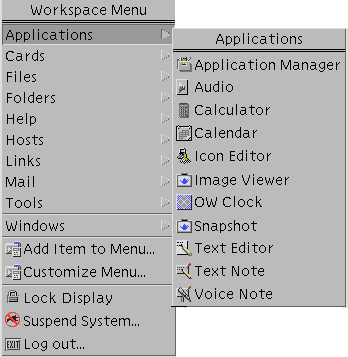 To Edit Text in a Field (Mouse)
To Edit Text in a Field (Mouse)
Select the text in the field to edit:
Characters - Drag from the first character to the last character
Word - Double-click the word
Line - Triple-click the line
Multiline - Quadruple-click the field
To deselect text, click an empty area in the window.
Type the replacement text.
To Edit Text in a Field (Keyboard)
Press Tab, Shift+Tab, or the arrow keys until you reach the field.
Use the editing keys to edit the field's contents, then type the replacement text.
Arrow key - Move the text insertion cursor
Backspace - Delete the character to the left of the cursor
Delete or Delete char - Delete the character to the right of the cursor
Control+Delete or Control+Delete char - Delete from the cursor to the end of the line
Press Control+Tab to move keyboard focus out of the text field.
Using Menus
Menus provide access to commands you use to manage windows and operate software applications.
Choosing a menu item performs an associated action on the currently selected object. For example, when you select a window and choose Minimize from its Window menu, the window becomes an icon.
Menu items that appear dimmed are available only under certain conditions. For example, the Window menu's Restore item is available only when the window is an icon.
Menus you'll use on the desktop include:
Menus that you "pull down" from an application's menu bar by clicking the menu's name or typing Alt and its mnemonic. A mnemonic is an underlined character in a menu or item name.

An application's File menu is shown here.
The sequence of keys listed to the right of some items is called a shortcut key. Typing mnemonics and shortcut keys gives you quick keyboard access to menu items.
Menus that "pop up" when you click mouse button 3 (or press Shift+F10) in an application window or on a workspace object.

Window Menu
Use Window menu items to control windows and window icons.
This menu is displayed when you:
Click the Window menu button in the upper left corner of a window
Click a window icon
Press Alt+Spacebar with the keyboard focus on a window or window icon

Restore - Turns an icon back into a window
Move - Changes the window's location
Size - Changes the size of the window (inactive for icons)
Minimize - Turns the window into an icon
Maximize - Enlarges the window to its greatest allowable size
Lower - Moves the window to the background
Occupy Workspace - Use to select the workspaces in which you want the window to appear
Occupy All Workspaces - Displays the window in all workspaces
Close - Closes the window, removing it from the workspace
Workspace Menu
The Workspace menu is a pop-up menu that contains items for managing the workspace.
To display the Workspace menu, click mouse button 3 on the workspace backdrop. You cannot access this menu through your keyboard.
Figure 1-5 Workspace Menu with Applications Submenu Displayed

Note - You can start many of the applications listed in the Applications submenu by clicking their Front Panel controls or Application Manager icons.




